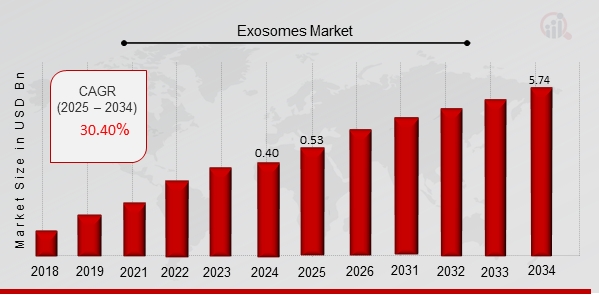As per MRFR analysis, the Exosomes Market Size was estimated at 0.40 (USD Billion) in 2024. The Exosomes Market Industry is expected to grow from 0.53 (USD Billion) in 2025 to 5.74 (USD Billion) till 2034, at a CAGR (growth rate) is expected to be around 30.40% during the forecast period (2025 - 2034).
Exosomes, these nanoscale vesicles secreted by cells, are emerging as a powerful force in diagnostics, therapeutics, and regenerative medicine. Their unique properties, including their ability to carry diverse biomolecules and communicate between cells, have ignited intense research interest and fueled the rapid growth of the exosomes market. This blog post explores the key market growth trends, shares, analysis, dynamics, scope, and future potential of this exciting field.
The exosomes market is experiencing robust growth, driven by several converging factors. Increasing awareness of the therapeutic potential of exosomes, rising investments in research and development, and the growing prevalence of chronic diseases are all contributing to market expansion. Furthermore, advancements in exosome isolation and characterization techniques are making it easier to study and utilize these tiny vesicles, further accelerating market growth.
Key Companies in the Exosomes Market Include
Danaher (Beckman Coulter Inc.)
Diagenode Inc.
Fujifilm Holdings Corporation
Hitachi Chemical Diagnostics Inc.
Lonza
MBL International
Miltenyi Biotec
Novus Biologicals
Qiagen
Thermo Fisher Scientific Inc. and Others.
Request a sample report for detailed insights: https://www.marketresearchfuture.com/sample_request/21546
Market Shares and Analysis:
The exosomes market is currently characterized by a mix of established players, innovative startups, and academic institutions. Key market segments include exosome isolation kits, exosome characterization services, and exosome-based therapeutics. Geographically, North America currently holds the largest market share, followed by Europe and Asia Pacific. However, the Asia Pacific region is expected to witness the highest growth rate in the coming years due to increasing research activities and rising healthcare expenditure.
Investment Opportunities:
The exosomes market presents significant investment opportunities for venture capitalists, pharmaceutical companies, and other investors. Companies developing innovative exosome technologies, diagnostic tools, and therapeutic products are attractive investment targets. Strategic partnerships and collaborations between established companies and startups are also becoming increasingly common in this rapidly evolving market.
Exosomes represent a paradigm shift in our understanding of intercellular communication and offer immense potential for revolutionizing diagnostics and therapeutics. While challenges remain, the exosomes market is poised for significant growth in the coming years. With continued research, technological advancements, and strategic investments, exosomes are expected to play a transformative role in medicine and healthcare, improving patient outcomes and addressing unmet medical needs.
Market Dynamics:
The exosomes market is dynamic and evolving rapidly. The increasing prevalence of chronic diseases, such as cancer, cardiovascular disease, and neurological disorders, is creating a significant demand for novel therapeutic approaches. Exosomes, with their ability to deliver targeted therapies and promote tissue regeneration, hold immense promise in addressing these unmet medical needs. However, challenges such as high production costs, scalability issues, and regulatory hurdles need to be overcome for widespread adoption of exosome-based products.
The exosomes market encompasses a wide range of applications, including:
Diagnostics: Exosomes can serve as biomarkers for various diseases, enabling early detection and personalized treatment strategies.
Therapeutics: Exosomes can be engineered to deliver therapeutic payloads, such as drugs, proteins, and nucleic acids, to target specific cells and tissues.
Regenerative Medicine: Exosomes can promote tissue repair and regeneration, offering potential treatments for conditions such as wound healing, osteoarthritis, and spinal cord injury.
Cosmetics: Exosomes are being explored for their potential to rejuvenate skin and hair.
Market segmentation:
The exosomes market is segmented by product & services (kits & reagents, instruments, and services), application (diagnostic and therapeutic), indication (cancer, neurodegenerative diseases, cardiovascular diseases, infectious diseases, and others), and region (North America, Europe, Asia-Pacific, and Rest of the World, with further breakdown by country).
The future of the exosomes market is bright. Continued research and development are expected to unlock the full potential of exosomes in diagnostics and therapeutics. Advancements in exosome isolation, characterization, and engineering technologies will further accelerate market growth. The development of standardized protocols and regulatory guidelines will also play a crucial role in fostering market expansion. The exosomes market is poised for significant growth in the coming years, transforming the landscape of medicine and healthcare.
Buy Latest Premium Market Research Now: https://www.marketresearchfuture.com/checkout?currency=one_user-USD&report_id=21546
Key Market Drivers:
Rising prevalence of chronic diseases: The increasing burden of chronic diseases is driving the demand for novel therapeutic approaches.
Growing investments in R&D: Significant investments in exosome research are fueling innovation and product development.
Increasing awareness of exosome potential: Growing awareness of the therapeutic and diagnostic applications of exosomes is driving market demand.
Technological advancements: Advancements in exosome isolation, characterization, and engineering are enabling the development of more effective exosome-based products.
Key Market Challenges:
High production costs: The production of exosomes at scale can be expensive, limiting their widespread adoption.
Scalability issues: Scaling up exosome production from lab-scale to industrial levels is a significant challenge.
Regulatory hurdles: The regulatory landscape for exosome-based products is still evolving, creating uncertainty for manufacturers.
Standardization of protocols: Lack of standardized protocols for exosome isolation, characterization, and storage can affect product consistency and quality.
Other Realted Insights:
Imatinib Drug Market Research Report To 2035
Fractional Flow Reserve Market Research Report To 2035
Media Contact
Company Name: Market Research Future
Contact Person: Media Relations
Email:Send Email
Country: United States
Website: https://www.marketresearchfuture.com

